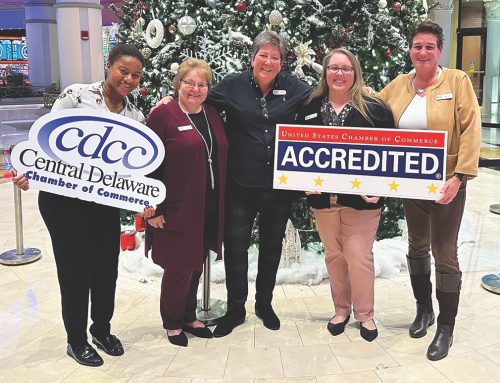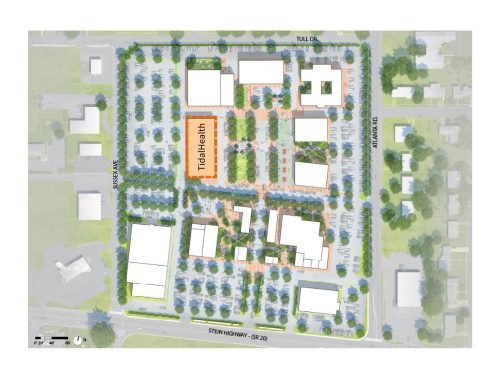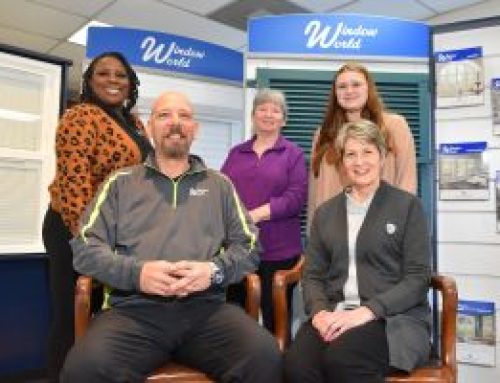While typical retirement age may be 62, some older adults choose instead to launch upon a second career later in life. That’s where Dr. Darren Blackston and Delaware State University can help.
DSU is a public, 1890 land-grant institution based in Dover. Blackston is executive director of DSU’s office of Adult & Continuing Education, Workforce Development and Training, Assessment, which offers life-long learning opportunities for adults.

Pictured (l to r) are: Dr. Darren D. Blackston, Executive Director, Adult & Continuing Education, Workforce Development, and Training, Assessment, and the Connected Degree Program; Ms. Theresa Rann, Employability Coach, Office of Adult & Continuing Education, Workforce Development and Training; Mr. Henry Clark, Jr., Associate Director of Proctoring, Office of Assessment Services; and Mr. William Harriford, Associate Director of Assessment Services, Office of Assessment Services. Photo by Bernard W. Carr
“People are no longer retiring at a certain age,” Blackston said. “Especially with the pandemic, many are changing careers. They’ll continue to work until they do decide to retire. We want to make sure that those who do not want to retire but move to a different job have the skills sets to be successful.”
He noted that employers want people with soft skills that seniors already have — the ability to communicate, time management skills, customer service skills, recognition that one has to show up on time for work. These potential employees just need training in core areas.
Workforce development is important to Blackston. Community members should have the opportunity to advance their skill sets, so they have not just a job but one that pays well, a living wage, he said.
The continuing education program has been in existence since the mid-1980s. As the program has grown, it has focused on a number of areas, including community development, which encompasses professional training, enrichment and career development. “As the needs change, we change,” Blackston said.
Blackston came to DSU in 2018 as a professor and still teaches graduate research. When he became executive director in 2020, he met with DSU President Tony Allen, who was then the provost; Dr. Saundra DeLauder, who is now the provost, and Dr. Patrice Gilliam-Johnson, former state Secretary of Labor who is now dean of Graduate, Adult and Continuing Studies, to discuss how to develop the continuing education program.
“We developed a strategic plan focused on community needs,” Blackston said. “Within that we found a lot of need in high demand job areas, including professional programs, IT and health care, which we really need in our state.”
A recent grant of more than two million dollars from the U.S. Department of Labor Employment and Training Administration and the Delaware Department of Labor will enable the university to provide IT training in two areas: computer support specialist and cyber security.
“With that grant we will work to educate 200 individuals over four years to be job ready Day One for careers in the IT field,” Blackston continued. “There is a disparity of minorities in those two fields. DSU is working with the state and other partners to provide free training. We are excited about that. In a short time we have gone from offering three programs to 23, all in nationally certified programs.”
Adult continuing education programs courses are free for seniors age 62 and up. There is an admission process required for degree or non-degree programs.
Blackston is active in community affairs, especially in Sussex County since becoming director of the connected degree program for DSU in Georgetown. That program is geared to support students with an associate’s degree to DSU who want to earn a four-year degree. When he started at DSU, social work was the primary offering. Seven more programs have been added, including accounting, education, general management, liberal studies, psychology, public health and TESOL (Teaching English to Speakers of Other Languages).
“I’ve met lots of seniors through my involvement in the Chamber of Commerce, Rotary and organizations such as First State Community Action,” he said. Before coming to DSU, Blackston was director of adult education for Appoquinimink School District in Middletown. Individuals would come to him for help getting a GED, often working more than one job. “It was disheartening,” he said. “They needed more specific skills sets.”
He has worked to find in-demand careers to meet the needs of workforce and industry but also of the community. The next step for DSU, he said, is to develop community-led personal enrichment programming. For example, there’s a demand for a course in jewelry making, but finding someone certified in that skill to teach a course has been difficult.
Blackston’s interest is not just with seniors. Also in Sussex County he has worked with the MERIT (Minority Engineering Regional Initiative Training) program. John Hollis is the founder and director of the program, which helps young minority men and women explore various science disciplines, with an eye toward pursuing them in college.
“The MERIT program is really exciting. Its students are some of the best Delaware has to offer. They’re being accepted at major colleges across the United States, and DSU has been added to that list. DSU is extremely affordable and it’s close to home. Parents are excited that rather than attending John’s Hopkins or Virginia Tech, their children can do the same thing at DSU and get a first class education at half the cost. These are highly advanced students, extremely talented, ready to go. DSU would be lucky to have them.”
Blackston emphasized that DSU is committed to serve all the community, from secondary, postsecondary and adults. “Delaware State University’s Adult & Continuing Education, Workforce Development and Training, Assessment division is quickly establishing a major footprint in Delaware, especially in Sussex County. As our programs grow so do our efforts in meeting the educational and vocational needs of all Delawareans.
“Our staff is tremendous,” Blackston said. “My direct team is not large, just a small team of five, but they are tremendously talented and very dedicated to our mission and vision. Our dean and associate dean are very supportive of our work; both Dr. Patrice Gilliam-Johnson and Mrs. Terry Jeffries are tremendous leaders.”
On July 1, 2021, DSU finalized an agreement to acquire Wesley College and its 50-acre downtown campus. DSU will gain 14 new academic programs, including an occupational therapy master’s program. The school will now be known as the Wesley College of Health & Behavioral Sciences within Delaware State University and the school will offer programs in disciplines including allied/public health, kinesiology, nursing, occupational therapy, psychology and social work.
With this acquisition, DSU now has two campuses in Dover in addition to locations in Georgetown and Wilmington. DSU’s main campus is located at 1200 N. DuPont Hwy. in Dover. Daytime telephone is 302-857-6060; evening, 302-857-6290. Visit online at www.desu.edu.





